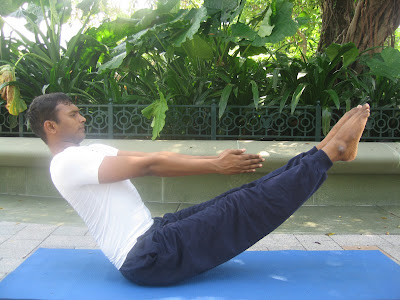

BETTER HEALTH AND FITNESS BY REGULAR PRACTICE OF YOGA THERAPY:
Yoga therapy is a westernized form of yoga that was developed specifically to assimilate yoga and conventional medicine in the treatment of the diseases and for the recreation of optimal health.
According to the practitioners of yoga therapy it is safer and more effective for the treatment of common medical conditions. It takes only individual health and physical limitations into account.
The main aim of yoga therapy is the mind/body integration, which strike into the normal healing properties of the body and helps to restore functions of your body and health.
Then practice yoga therapy for your better health and fitness. Strictly speaking yoga therapy is not an alternative medicine.
Its daily practice is often seen as a way of gaining control over your health.
Most of the practices of yoga therapy are used as complementary practices to conventional medicine.
Some of these practices are exercise, meditation and massage.
The main intent and goal of yoga therapy is the enlightenment of the spirit, but its aim includes physical health and well-being.
Yoga therapy consists of three basic parts of your body which work together.
Physical posture:
It helps to stretch and strengthen your muscles. It also improves your mobility, flexibility and balance. The proper posture enhances your body's natural functions of circulation, elimination, respiration, and digestion.
Breathing technique:
It mainly focuses on awareness of breath and helps promote calm, focus the mind and relieve stress and fatigue.
Relaxation technique:
It mainly helps you to recharge and ease tension.
Benefits of yoga therapy:
Yoga therapy shows positive results in treating depression.
Deep breathing associated with yoga is beneficial in controlling premature ventricular complexes.
Yoga therapy is beneficial in post-treating strategy, breast cancer and other survivors.
Yoga therapy shows significant benefits that includes emotional functions, fitness variations and psychological benefits. It also shows variations in tension, mood disturbances, cognitive function and gastrointestinal disturbances.
Practice of regular yoga exercise increases your body's ability in using antioxidants. This is beneficial in the prevention of cancer.
If you are a diabetic patient then yoga therapy improves nerve function and lower blood sugar.
If you are suffering from rheumatoid arthritis, the practice of yoga increases your hand grip strength.
Yoga helps in treating some problems like asthma, respiration problems, back pain, etc. it help in weight reduction.
Criticisms of yoga therapy:
The practice of yoga therapy is impossible if you have limited mobility and flexibility.
While attempting some of the postures of yoga without any pre-exercise preparation then there is a possibility of getting injured.
Before going to start a new treatment program, you must inform to your health care provider about any other fitness or alternative treatment programs that you have taken. Yoga therapy show promise in treating a number of conditions.
Yoga therapy is a westernized form of yoga that was developed specifically to assimilate yoga and conventional medicine in the treatment of the diseases and for the recreation of optimal health.
According to the practitioners of yoga therapy it is safer and more effective for the treatment of common medical conditions. It takes only individual health and physical limitations into account.
The main aim of yoga therapy is the mind/body integration, which strike into the normal healing properties of the body and helps to restore functions of your body and health.
Then practice yoga therapy for your better health and fitness. Strictly speaking yoga therapy is not an alternative medicine.
Its daily practice is often seen as a way of gaining control over your health.
Most of the practices of yoga therapy are used as complementary practices to conventional medicine.
Some of these practices are exercise, meditation and massage.
The main intent and goal of yoga therapy is the enlightenment of the spirit, but its aim includes physical health and well-being.
Yoga therapy consists of three basic parts of your body which work together.
Physical posture:
It helps to stretch and strengthen your muscles. It also improves your mobility, flexibility and balance. The proper posture enhances your body's natural functions of circulation, elimination, respiration, and digestion.
Breathing technique:
It mainly focuses on awareness of breath and helps promote calm, focus the mind and relieve stress and fatigue.
Relaxation technique:
It mainly helps you to recharge and ease tension.
Benefits of yoga therapy:
Yoga therapy shows positive results in treating depression.
Deep breathing associated with yoga is beneficial in controlling premature ventricular complexes.
Yoga therapy is beneficial in post-treating strategy, breast cancer and other survivors.
Yoga therapy shows significant benefits that includes emotional functions, fitness variations and psychological benefits. It also shows variations in tension, mood disturbances, cognitive function and gastrointestinal disturbances.
Practice of regular yoga exercise increases your body's ability in using antioxidants. This is beneficial in the prevention of cancer.
If you are a diabetic patient then yoga therapy improves nerve function and lower blood sugar.
If you are suffering from rheumatoid arthritis, the practice of yoga increases your hand grip strength.
Yoga helps in treating some problems like asthma, respiration problems, back pain, etc. it help in weight reduction.
Criticisms of yoga therapy:
The practice of yoga therapy is impossible if you have limited mobility and flexibility.
While attempting some of the postures of yoga without any pre-exercise preparation then there is a possibility of getting injured.
Before going to start a new treatment program, you must inform to your health care provider about any other fitness or alternative treatment programs that you have taken. Yoga therapy show promise in treating a number of conditions.

No comments:
Post a Comment